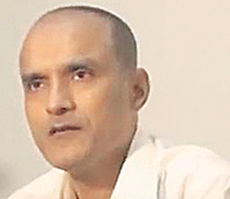After ICJ stay, Pak to change lawyers in Kulbhushan Jadhav case
19 May 2017
After the International Court of Justice on Thursday stayed the execution by Pakistan of Indian national Kulbhushan Jadhav, Pakistan has decided to replace the lawyers that represented it at The Hague, media reports in Islamabad said.
 The Nation quoted Sartaj Aziz, the foreign affairs adviser to Prime Minister Nawaz Sharif, as saying that Islamabad will appoint a new team of lawyers to defend Pakistan's position at the ICJ in the Netherlands.
The Nation quoted Sartaj Aziz, the foreign affairs adviser to Prime Minister Nawaz Sharif, as saying that Islamabad will appoint a new team of lawyers to defend Pakistan's position at the ICJ in the Netherlands.
The Pakistani legal team was led by Khawar Qureshi, while India was represented by Harish Salve.
State-run news agency Associated Press of Pakistan further reported Aziz saying that Qureshi had courageously represented Pakistan at the International Court of Justice.
The ICJ on Thursday allowed India's petition that Pakistan be directed not to execute Indian national Kulbhushan Jadhav, who was handed a death sentence by a Pakistani military court in April this year (See: ICJ stays Pak decision to execute Kulbhushan Jadhav).
The ICJ, accepting India's plea, said Pakistan should not hang Jadhav until the court hears the matter in full and that Islamabad must inform the world court of the steps it has taken to ensure that the Indian national is not executed.
Responding to the ICJ order, Aziz, Pakistan's de facto foreign minister, was reported to have said, "Pakistan's security is so important and we have to maintain our fundamental sovereign right."
ICJ President Judge Ronny Abraham, while delivering ICJ's interim verdict on the Jadhav death penalty case, rejected Pakistan's contention that the World Court has no jurisdiction on the matter. Prima facie, the ICJ has jurisdiction on the Jadhav case, Abraham said, rejecting one of the Islamabad's main arguments against the Indian case.
Invoking the Optional Protocol of the Vienna Convention, India had contended that the International Court of Justice has the jurisdiction to take up the Jadhav death penalty case.
The ICJ has not yet ruled on India's main argument that Kulbhushan Jadhav's trial in Pakistan was in violation of the Vienna Convention on Consular Access.
Since Jadhav's arrest in 2016, Pakistan has rejected 16 Indian requests for consular access. Islamabad has claimed that since Jadhav is charged under the country's espionage laws, it does not need to provide New Delhi with consular access.
Having ordered Pakistan not to execute Jadhav, the ICJ will now seek comprehensive submissions from both New Delhi and Islamabad on their respective cases. The dates or the schedule of upcoming hearings at The Hague have not yet been announced, but India Today reports that the process could take years.




















